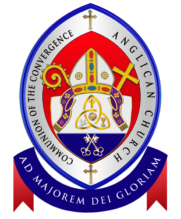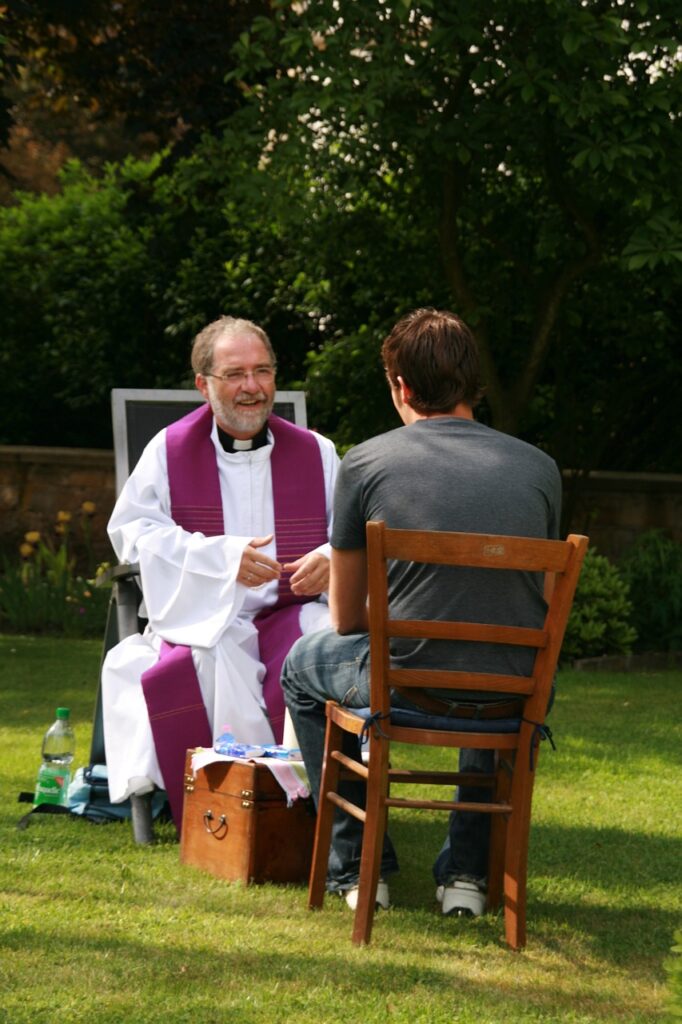Confession – Reconciliation of a Penitent
The Rev. Canon Eugene Fort
Confession which is an admission, a declaration, or acknowledgment is significant to the worship of God both in the Old Testament and in the New Testament. Generally, the term, confession, reflects either one of two primary responses to God: confession of sin or confession of faith. Here our focus in The Reconciliation of a Penitent is the confession of sin.
In the Communion of the Convergence Anglican Church (CCAC), reconciliation including confession, expressing appropriate contrition, offering acts of penance, and receiving absolution is a sacrament. Think of a sacrament as a grace from God that is what God is doing in action for us rather than what we are doing for God!
In the CCAC, we celebrate the Holy Trinity – reflective of the three streams of the Church: fully Sacramental; fully Evangelical, fully Charismatic. Our need for acts from God is brought into our guilty conscience. The conviction of our spiritual deadness – prompted in the power of the Holy Spirit motivates us to make our individual and personal confession.
Since in the opening chapter of 1st John (verse 9), we have an instruction straight from God’s Word (flowing in the Evangelical stream) that reveals the importance and necessity of confession, we take particular interest in exploring in greater detail.
9 If we confess our sins, He (God) is faithful and just to forgive us our sins and to cleanse us from all unrighteousness. [1 John 1:9 ESV]
John encourages us to face up to the past. There is no point trying to hide – God sees – God knows – God sees and knows more than we allow ourselves to remember. Consider the experience of Adam and Eve trying to clothe themselves and hide from God in the garden (Genesis 3:8ff) – God already saw and knew their sin. Now Jesus has made the ultimate sacrifice – His blood poured out to cover the sins of the world. That God-life given on our behalf and in our place, is available for all who “walk in the light.”
When we consciously turn to the light – when we face up to sin or things that have gone wrong in the past and do not try to hide these things either from ourselves or from God – and we further are determined to make corrections in our behavior for the future – two things happen:
1) We find ourselves sharing that intimate God-life, not only with God himself but with one another.
2) We realize that Jesus’ blood miraculously makes us clean, pure and fresh inside. Confession relieves our souls – it deals with the nasty stain, the residual dirtiness, the scratchy, ugly feeling that something went badly wrong – something that we otherwise could not dismiss. All of that is gone when we turn to the light and start to walk in it – and all because of Jesus.
John at the beginning of Chapter 2 (1 John 2:1) says, “I am writing these things to you so that you may not sin.” The point is that there is a delicate balance between being forgiven and sinning. Some will react with the wrong notion of confession – “If God will forgive just like that – I will go on sinning.” This is not the true message of the Gospel – John the Baptist in preparing the way for Jesus proclaims, “Repent, for the kingdom of heaven is at hand.” [Matthew 3:2 ESV] In preparing to make a confession, one should take time to make an examination of conscience, to have sorrow for those sins, and to resolve to amend life so as not to commit these sins again (repentance – turning around).
Confession as presented in The Book of Common Prayer (1979) is a Rite of the Church with the title: The Reconciliation of a Penitent (BCP page 447). The introductory material (BCP page 446) is important to this Rite:
The ministry of reconciliation, which has been committed by Christ to his Church, is exercised through the care each Christian has for others, through the common prayer of Christians assembled for public worship, and through the priesthood of Christ and his ministers declaring absolution.
The Reconciliation of a Penitent is available for all who desire it. It is not restricted to times of sickness. Confessions may be heard anytime and anywhere.
The absolution in these services may be pronounced only by a bishop or priest. Another Christian may be asked to hear a confession, but it must be made clear to the penitent that absolution will not be pronounced; instead, a declaration of forgiveness is provided.
The content of a confession is not normally a matter of subsequent discussion. The secrecy of a confession is morally absolute for the confessor, and must under no circumstances be broken.
Sin is real and present in this world – the wages of sin is death [Romans 6:23]. Jesus taught that everyone who commits sin is a slave to sin [John 8:34]. Sin brings death, abandonment, homelessness of the soul, and utter darkness. Jesus knew that redemption from the power of sin was humanity’s greatest need. The reality of sin in this world is why Jesus came among us. His death and resurrection were for the purpose of resolving the problem of sin and providing people the opportunity to enter and maintain relationship with God. Jesus, the Son of God, makes you free. The free gift of God is eternal life in Christ Jesus our Lord. The absolution (BCP page 448) given by the bishop or priest concluding the confession rite echoes this freedom:
Our Lord Jesus Christ, who offered himself to be sacrificed for us to the Father, and who conferred power on his Church to forgive sins, absolve you through my ministry by the grace of the Holy Spirit, and restore you in the perfect peace of the Church. Amen.
Consider the Validation noted by Henry & Melvin Blackaby:
There is power in the gospel to set people completely free from the destructive power of sin and to fill their lives with all the fullness of God. That gospel includes the cross, the resurrection, and the sending of the Holy Spirit at Pentecost. All three are equally important for the believer to understand and experience. (Experiencing the Resurrection, the everyday encounter that changes your life, p1)
You have the choice to accept or reject God. Reconciliation is a positive step toward accepting God (Father, Son, & Holy Spirit) and receiving His gifts of grace. By faith, accepting the revelation of God brings you into relationship with Him that produces blessings in your life. As you turn from sin, humbly confessing and acknowledging that God is God and you are not – you express your faith in Jesus to save and He imparts His righteousness upon you. Experiencing this reconciliation is the best manner to learn and discover Jesus’ blessings.
Canon Gene+


